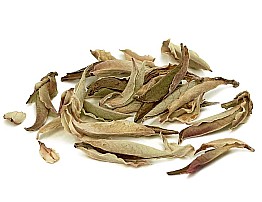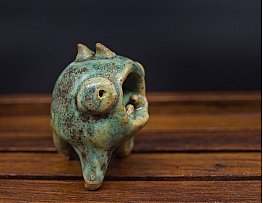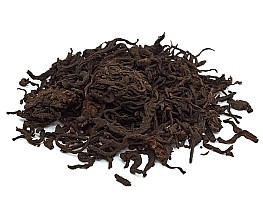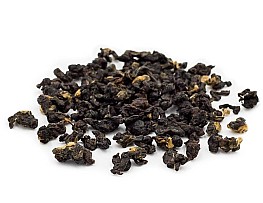2016 Тайский дикий пуэр со старых деревьев
Урожай: Весна 2016
Высота: 1500 м
Возраст деревьев: 500+ лет
Доступность: На складе
Дикий пуэр из тайских джунглей. Сделан фактически из тех же старых деревьев, что и Е-шен “Хозяин леса”, но с тайской стороны.
Меня подмывает сказать, что это тот же самый чай, тем более, что и терруар, и год урожая совпадает. Но это совсем другой чай. Более того, это, наверное, самый необычный чай в нашем ассортименте.
Промытый и прогретый, он выдает невероятную палитру: лак для дерева, канифоль, льняное масло, лекарственные травы на фоне чего-то теплого и сладкого.
Вкус плотный, с высоким уровнем кислотности. Масляно-лаковые, древесные тона с оттенками кислых ягод (брусника, клюква), кипрей, смородиновый и брусничный лист. Если взять свежие ветки ивы, подгулявшей с эвкалиптом, сделать холодный отжим и добавить чайную ложку брусничного варенья, возможно, получится что-то похожее.
По мере продвижения чайной сессии, кислота уходит, высвобождая тепло, сладость и очень специальное состояние.
Хорошие дикие чаи с больших деревьев всегда дарят особое состояние. Оно тонкое, мягкое, плавное. Если выразить его в трех словах, это будет расслабленность, безмятежность и позитивность (буквально, приподнятое настроение). Я пью этот чай на 80% ради состояния и на 20% ради необычного “лаково-древесного” вкуса.
Послевкусие чая чёткое, маслянисто-древесное. Объемное, теплое и приятное.Горечи в этом чае нет совсем. Не важно, как вы будете его заваривать, горечь в вашей чашке не появится - большие дикие деревья гарантируют.
Итак, чай, действительно, необычный, хотя работает во вполне “е-шеновых” рамках. Его можно пить на ночь, кофеина там практически нет. Зато L-теанина, судя по воздействию, много - чай хорошо успокаивает, мягко расслабляет и поднимает настроение. После полноценной сессии с этим чаем, всё станет немного светлее, проще и понятнее.


Отзывы (4)
1. Аромат сухого листа завораживает глубиной. Тонкостенный глиняный чайник 7 гр/150мл 90градусов вода. Короткие экспозиции. Первые 2 проливы- уникальный вкус, завораживает. Третий пролив- появляется кислинка приятная. Начиная с 4-го пролива пошел одинаковый компот из сухофруктов. Оценка 3.
2. Я уже писал отзыв на этот чай. но захотелось исправить оценку с 3 на 4. потому что его нужно пить даже ради трех проливов и оценка 3 это будет несправедливо заниженный мной федбэк.
Комментарий от TEASIDE:
Дикий чай не уходит в горечь при перестаивании, вкус дички гораздо тоньше, чем у ассамики. Это может вводить в заблуждение относительно его стойкости и изменений во вкусе.
При стандартном соотношении чая к воде 1:20, на экспозициях в 10-30 секунд, чай держит больше семи проливов.
Это же исходит и из обычной логики. В виду плодородности почвы, редкому сбору и возрасту деревьев, материал со старых деревьев, растущих в джунглях, обладает максимальным потенциалом к стойкости проливов. Приведенные здесь фотографии деревьев подлинные и сделаны прямо на местах сбора.
Очень мощная ци, и сильный отчетливый вкус, который совершенно уникален...
приятный, но отличается (также от Lord Of The Forest), поэтому я бы рекомендовал сначала попробовать.
Букет: очень спелый, как бы перебродивший фруктовый аромат вишни с некоторой старой кожаной нотой, плюс очень отчетливый темный итальянский мед горного леса, увенчанный сушеным инжиром и изюмом. Если копнуть чуть глубже, то его сердцевина напоминает мне автомастерскую или, лучше сказать, лак для автомобильных красок, но не в плохом или общем интенсивном смысле.
Ликер: во вкусовом отношении он почти так же ясен и похож на то, что предвещала его ароматическая атмосфера. Глубокие ноты кислого вишневого сока с нотами старой кожи и сухофруктов, а также оставляет после себя травянистое, мятное ощущение в горле, очень необычное, ничего подобного я раньше не испытывал. Этот чай действительно развивался в совершенно другом направлении, особенно с его явно кислым профилем, это нечто совершенно неожиданное и очень захватывающее.
Короткие (несколько секунд) проливы, температура воды 90 градусов Цельсия. Ликер очень прозрачный бледно-желтого оттенка. Вкус травянистый и древесный, но в то же время немного фруктовый. Общий вкус довольно необычный, но нет ни терпкости, ни горечи. Послевкусие не имеет типичной для шэн пуэра сладости. Вкус во рту слегка сухой и липкий, способствующий слюноотделению. Влажные листья имеют бледно-зеленый цвет и свежий аромат, напоминающий зеленые ягоды. Этот чай выдерживает много настоев.




















